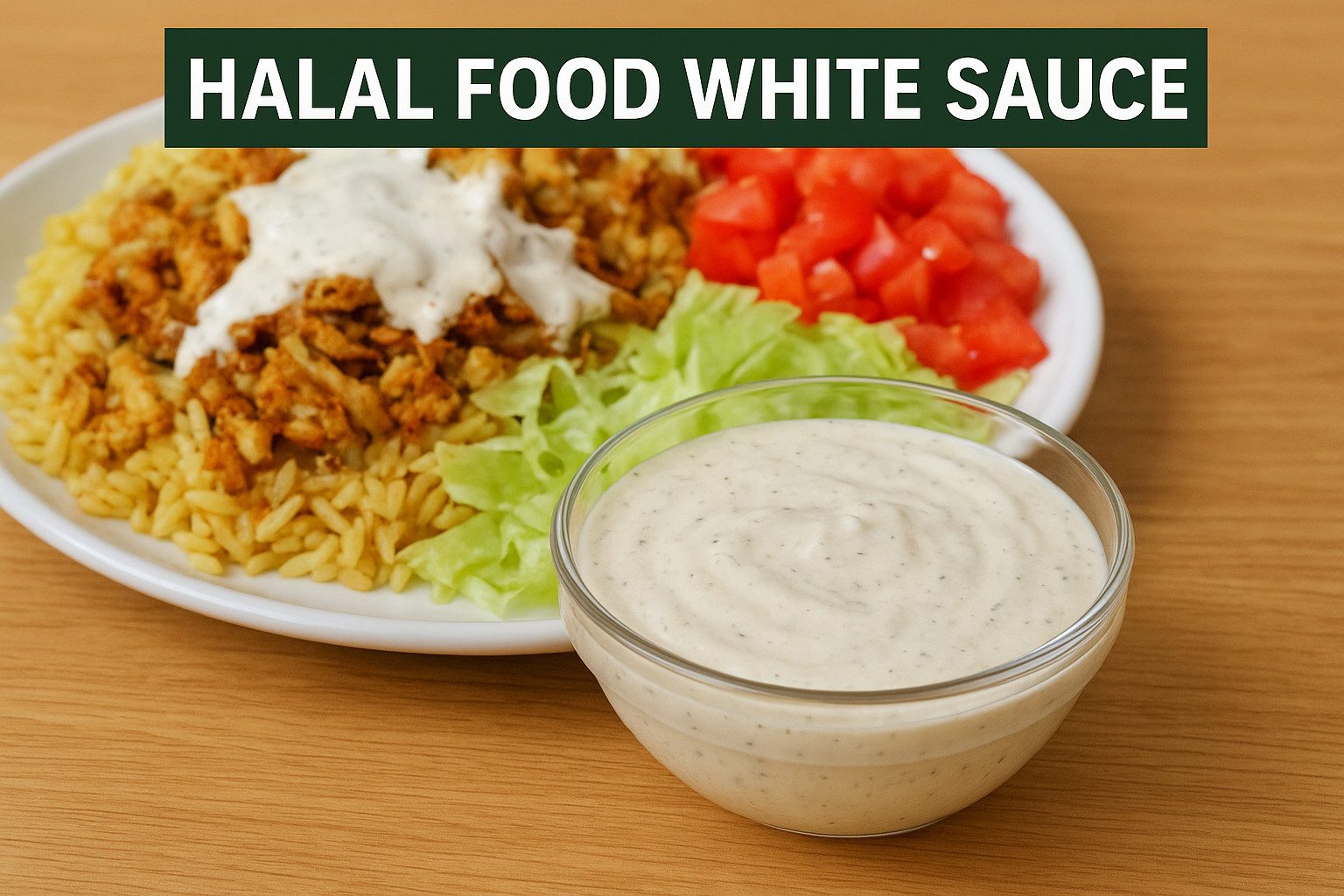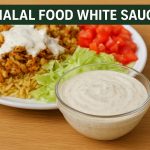1. My personal experience with halal food white sauce (Experience)
I still remember my first halal cart platter — the steam rising from spiced chicken, the bright tomatoes, and then that first drizzle of white sauce.
It felt like the plate came alive: the sauce added creaminess, a garlicky tang, and a rounded salt-and-acid balance that made every bite sing. Over the years I’ve tried the white sauces from carts, food trucks, and homemade versions; I’ve also made my own bottle to keep in the fridge.
The homemade version helped me control ingredients (less sugar, fresh garlic, and full-fat yogurt for richness) and ensure everything matched my halal diet choices.
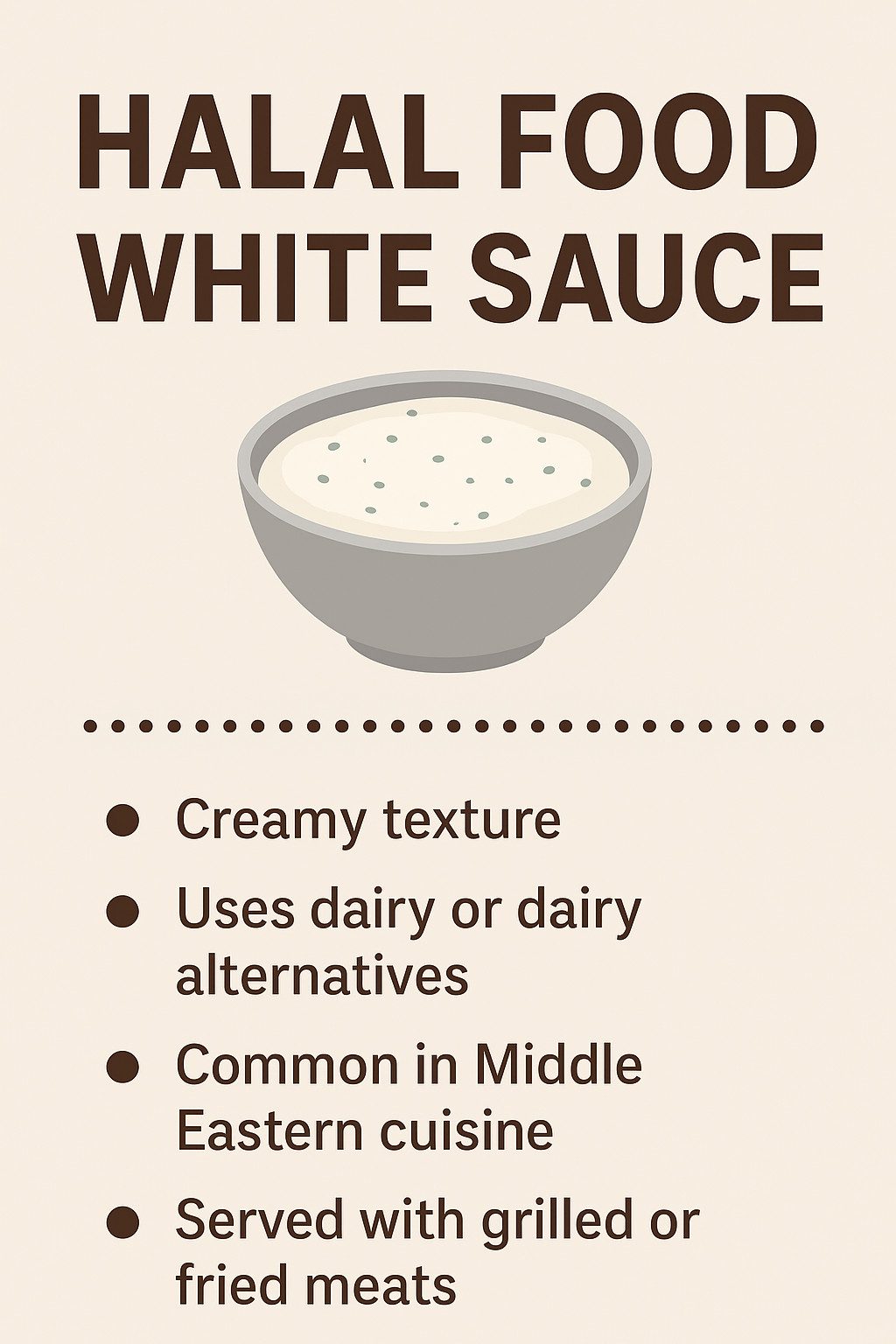
2. What is “halal” — the basics you should know (Expertise)
In short, “halal” means permitted under Islamic law. For food this generally includes: permissible ingredients, slaughter methods for animal products (zabiha/dhabihah for meat), and avoidance of forbidden items like pork and intoxicants.
In practice, many consumers rely on recognized halal certifiers to confirm that a packaged product or prepared meat meets these requirements. Organizations such as the Islamic Food and Nutrition Council of America (IFANCA) provide certification and guidance; look for certifier logos when buying packaged or restaurant products.
Quick note on labeling and regulation (USA)
In the U.S., federal agencies (USDA for meat/poultry, FDA for most other foods) oversee food safety and truthful labeling, but halal itself is usually verified by third-party certifiers — and agencies expect claims like “halal” to be backed by documentation. That’s why trusted halal logos and clear certifier information matter.
3. What exactly is “white sauce” used with halal food?
The white sauce commonly served with halal street food is a creamy, tangy, garlicky condiment. Classic versions balance mayonnaise (or mayo-like base) and yogurt/sour cream, with lemon or white vinegar, garlic (fresh or powder), salt, pepper, and sometimes a touch of dill or sugar.
It’s versatile — great on rice platters, in pita sandwiches, or as a dip for veggies. Food writers and recipe testers have reverse-engineered the famous cart-style white sauce — you’ll find similar recipes in reputable food outlets.
Simple halal-friendly white sauce (my go-to recipe)
My refrigerator-ready version (yields about 1 cup):
- ½ cup mayonnaise (choose a halal brand or make at home)
- ½ cup plain Greek yogurt (or sour cream for extra richness)
- 1–2 tbsp lemon juice or 1 tbsp white vinegar
- 1–2 garlic cloves, finely minced (or ½–1 tsp garlic powder)
- ½ tsp salt, ¼ tsp black pepper
- 1 tsp dried parsley or dill (optional)
- 1 tsp sugar or honey (optional, balances acidity)
Method: Whisk everything together until smooth. Adjust lemon and garlic to taste. Chill for at least 30 minutes to let flavors marry. Keeps 4–5 days in the fridge. (If serving with halal meat, confirm the meat’s halal status separately.)
For another popular variant and cart-style notes, see recipe writeups and tests from food sites.
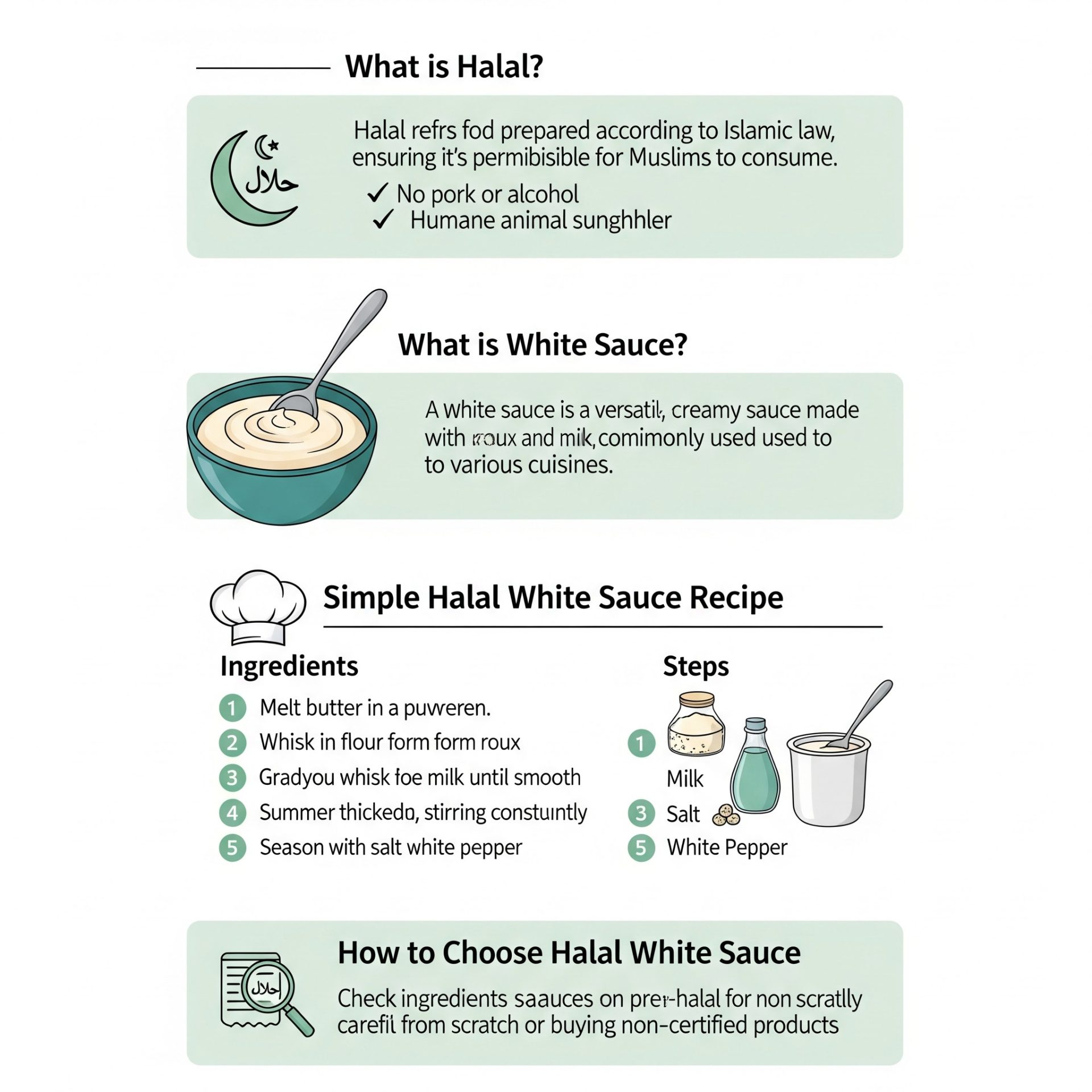
4. Is the white sauce itself halal?
Generally, the components of the white sauce (mayo, yogurt, lemon, garlic) are halal — but a few practical cautions:
- If buying pre-made mayonnaise or dressings, check ingredient lists for non-halal additives (rare, but sometimes an emulsifier or flavoring could be derived from non-halal sources).
- Some sauces or chains may add flavor extracts or stabilizers. If halal certification matters to you, prefer products or restaurants that display trustable halal certification or are transparent about suppliers.
- Cross-contact: at food trucks or kitchens that handle non-halal items (pork, alcohol-based marinades), cross-contamination can be a concern for strict consumers — ask about kitchen practices if needed.
In short: the recipe ingredients are normally halal, but always verify packaged products or restaurant practices if certification or strict separation matters to you. Agencies and certifiers provide guidance about what counts as halal and how labeling should be supported.
5. Health perspective — is white sauce healthy?
White sauce is a high-fat condiment (mayo + yogurt base). From a nutrition perspective:
- Calories & fat: Mayo-heavy versions are calorie-dense. Using Greek yogurt or reducing mayo lowers calories and adds protein.
- Sodium & additives: Store-bought sauces can have added sugar, sodium, or preservatives. Check labels if you’re watching these.
- Balance: Used sparingly, it’s a flavor booster — a little can make vegetables or lean meat more enjoyable, which can be a net win for eating variety and satisfaction.
My practical tip: I use a higher-ratio yogurt base (60% yogurt / 40% mayo), add fresh garlic and lemon, and keep a squeeze bottle so I can control portions. This keeps texture and tang while lowering calories and increasing protein.
6. Why halal matters to a Muslim consumer (Trustworthiness & Authoritativeness)
For many Muslims, halal is a faith-based requirement — it’s about following dietary law. For others, halal also signals supply-chain transparency: third-party certification usually means an auditor has checked ingredients, slaughter method, and handling practices.
That combination of religious observance and traceability is why halal logos and reputable certifiers carry weight.
If you want to trust a product or restaurant, look for:
- Clear halal certifier logo and certifier name (e.g., IFANCA’s Crescent-M in many U.S. products).
- Transparent ingredient lists and vendor statements about cross-contact.
- For meat, confirmation that animals were processed according to zabiha/dhabihah when that’s required by your practice.
7. How to choose halal white sauce in restaurants or stores
- Ask directly: Ask the vendor if their white sauce is made with halal-certified ingredients or in a halal-certified kitchen.
- Look for certification: For packaged condiments, find a halal certifier logo and, if in doubt, check the certifier’s website or product page.
- Check suppliers: Larger chains sometimes list suppliers online — verify that the mayonnaise or yogurt brand they use is halal-certified if you need that assurance. (USDA/FDA rules require truthful labeling, and third-party certifiers back halal claims.)
- When in doubt, DIY: Homemade sauce (recipe above) is the simplest way to control every ingredient.
8. Common questions I get asked
Q: Can white sauce contain alcohol or non-halal ingredients?
A: Not usually — the core ingredients are halal. But some flavorings or extracts could contain alcohol; always check packaged ingredient lists or ask the vendor.
Q: Is the white sauce the same as tzatziki or tahini?
A: No — tzatziki is yogurt + cucumber + dill, tahini is sesame paste. The halal cart white sauce is a distinct Americanized combo (mayo + yogurt + acid + garlic), different in texture and flavor.
Q: Does halal certification apply to sauces?
A: Yes — packaged sauces can be certified halal by recognized certifiers, and restaurants can be certified for products they prepare. Certification gives consumers documented assurance.
9. External resources and further reading (trusted sources)
- IFANCA — Islamic Food and Nutrition Council of America (halal certifier and resources). 10
- USDA / FSIS labeling guidance (2024) — explains labeling oversight relevant to halal claims. 11
- Epicurious — Halal cart-style white sauce (recipe & notes) — useful for replicate-the-original tests. 12
- Chili Pepper Madness — Halal white sauce recipe — another tested home recipe and notes.
10. Internal link (as requested)
For more about halal food options and context in the United States, see this internal resource:
Halal Food in the USA
11. Practical tips — my quick checklist before ordering or buying
- Does the vendor or product show a known halal certifier logo? If yes, note the certifier and, when curious, check the certifier’s website.
- Ask if the kitchen uses separate utensils for halal and non-halal items (important for stricter consumers).
- If buying packaged sauce, read the full ingredient panel for uncommon additives.
- Make it at home using the recipe above — that’s the fastest guarantee.
12. Closing — final thoughts (Trust & authenticity)
Halal food white sauce is one of those small culinary joys that transforms simple plates into memorable meals. My own experience — tracking down cart versions, testing homemade recipes, and choosing halal-certified ingredients — has taught me that satisfaction, faith, and transparency can coexist: a delicious sauce need not compromise your halal standards.
If you care about strict halal observance, rely on certifiers and direct questions; if you just want a great flavor boost, try the yogurt-forward homemade version I described above.
If you want, I can turn this into a printable recipe card, or supply a step-by-step video script showing how I make my version in under 5 minutes. Just say which format you prefer.
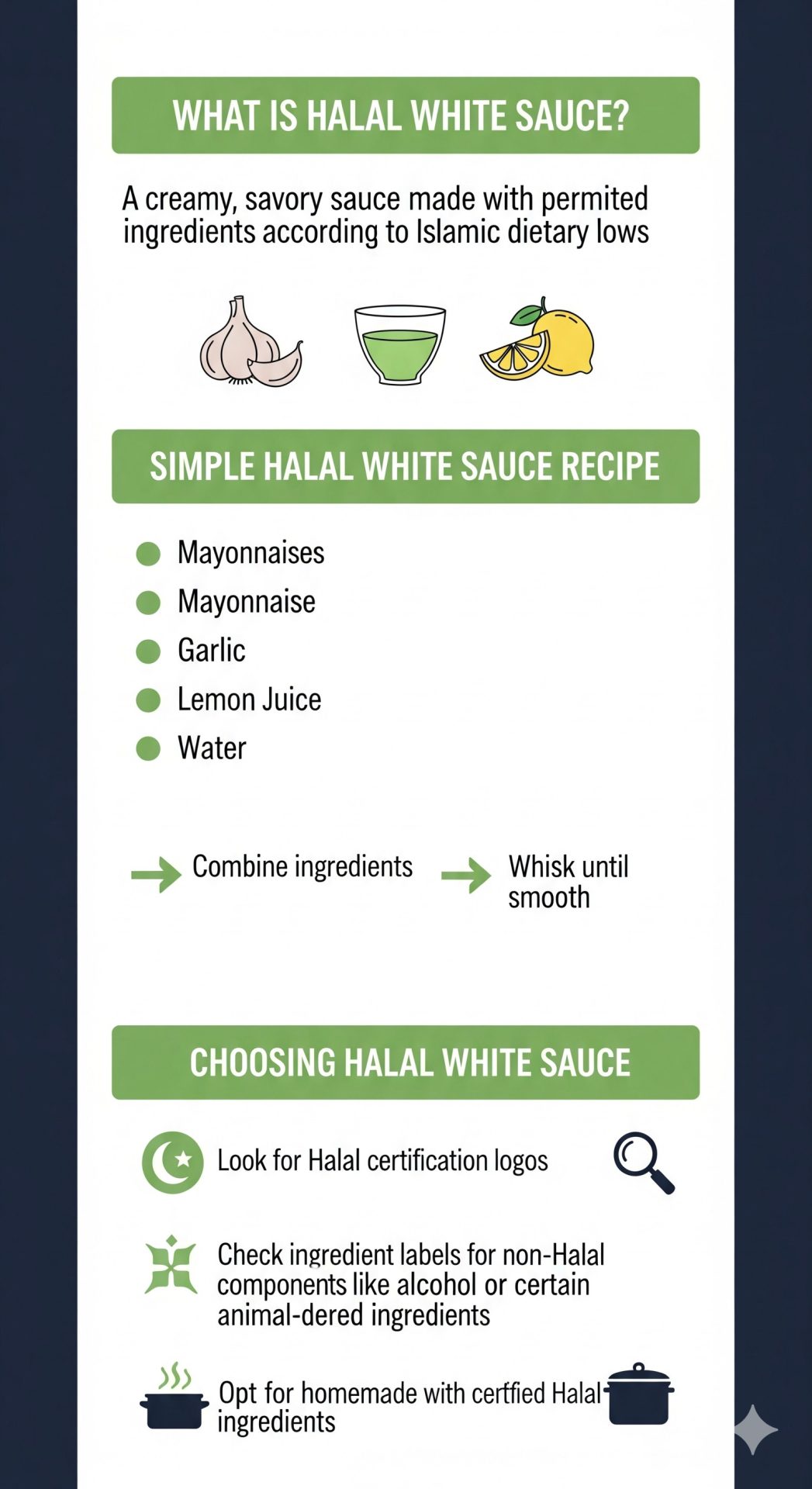
Author Name: Miraz Raj
Email: iammirazraj@gmail.com
